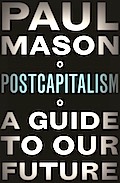… en het begin van het postkapitalisme. Het is duidelijk dat het neoliberalisme op alle fronten faalt. Alles wordt duurder en minder. De kloof tussen arm en rijk wordt groter. Het communisme is gevallen. Het is nu de beurt aan het kapitalisme. Het begon met de groei van de informatie- en participatiemaatschappij (niet participatie in de zin van ‘alle Calimero’s moeten aan het werk geschopt worden’, dat moeten ze ook - toch ziet zelfs Rutte geen heil meer in de Dikke Ikke). Ook dit weblog maakt al deel uit van het postkapitalisme. Het geeft informatie, degelijke informatie, informatie die u niet meteen in de mainstream media zult aantreffen en die informatie, inclusief filmpjes en foto’s, is gratis. Het kapitalisme is in zijn destructieve fase. Het is niet duurzaam. Er moet wat nieuws komen.

Vandaag kwam het boek uit van Paul Mason, PostCapitalism, A guide to our future. Vandaag stond het al op mijn iPad. Ik kan het iedereen aanraden. Het ontbreekt onze hedendaagse politici aan visie en sociaal gevoel. Dat zie je overal. Van stadsdeel Zuidoost tot Den Haag. De crisis wordt afgewenteld op de gewone burgers om de grote boosdoeners, de banken, te redden. Dat is niet houdbaar. De revolutie is begonnen. Zonder wapens. Met woorden en gedachten. Doet u mee? PostKapitalisme is in. De blogs verschijnen overal.
Guardian - Paul Mason: "The end of capitalism has begun
Almost unnoticed, in the niches and hollows of the market system, whole swaths of economic life are beginning to move to a different rhythm. Parallel currencies, time banks, cooperatives and self-managed spaces have proliferated, barely noticed by the economics profession, and often as a direct result of the shattering of the old structures in the post-2008 crisis.
The 2008 crash wiped 13% off global production and 20% off global trade. Global growth became negative – on a scale where anything below +3% is counted as a recession. It produced, in the west, a depression phase longer than in 1929-33, and even now, amid a pallid recovery, has left mainstream economists terrified about the prospect of long-term stagnation. The aftershocks in Europe are tearing the continent apart.
The solutions have been austerity plus monetary excess. But they are not working. In the worst-hit countries, the pension system has been destroyed, the retirement age is being hiked to 70, and education is being privatised so that graduates now face a lifetime of high debt. Services are being dismantled and infrastructure projects put on hold.
Even now many people fail to grasp the true meaning of the word “austerity”. Austerity is not eight years of spending cuts, as in the UK, or even the social catastrophe inflicted on Greece. It means driving the wages, social wages and living standards in the west down for decades until they meet those of the middle class in China and India on the way up.
Neoliberalism, then, has morphed into a system programmed to inflict recurrent catastrophic failures. Worse than that, it has broken the 200-year pattern of industrial capitalism wherein an economic crisis spurs new forms of technological innovation that benefit everybody.
We need more than just a bunch of utopian dreams and small-scale horizontal projects. We need a project based on reason, evidence and testable designs, that cuts with the grain of history and is sustainable by the planet. And we need to get on with it.”
Post-Capitalism: Rise of the Collaborative Commons
De crisis is een bewuste strategie voor sociale afbraak: "De wereld verkeert vandaag in een diepe crisis. Tegelijk wil men ons doen geloven dat het neoliberale groeimodel het enig mogelijke is. De Portugese socioloog Boaventura de Sousa Santos doorprikt die mythe en maakt er zijn missie van om een kennisleer van alternatieven uit te bouwen. Hoog tijd dat de universiteiten ramen en deuren openen om alternatieve kennis binnen te laten, aldus de Sousa.”
Bezuinigingen vernietigen het belangrijkste wat de menselijke beschaving ooit heeft voortgebracht: de sociale maatschappij, civil society, vrijheid, gelijkheid en broeder/zusterschap. Neoliberalisme is de transfer van geld van de een naar de ander. Dat zie je op alle gebieden, ook in het natuurbeleid. De natuur moet wijken voor de winsten van de multinationals. Onze leiders verworden tot stromannen van de banken. Het gaat om het behoud van banken, niet van mensen.
The Political Roots of Widening Inequality: "The key to understanding the rise in inequality isn’t technology or globalization. It’s the power of the moneyed interests to shape the underlying rules of the market.”
Democratie in Nederland nu ook formeel afgeschaft: "Een meerderheid van de Tweede Kamer gaat akkoord met het vrijhandelsverdrag TTIP, inclusief het omstreden Investor-State Dispute Settlement (ISDS). Vóór stemden PvdA, D66, CDA, VVD, PVV en D66. Tegen stemden SP, PvdD, CU, Bontes(!), GL, Kuzu en 50+. Daarmee wordt ook formeel de democratie in Nederland afgeschaft. Stemmen was al een tamelijk zinloos ritueel, maar is nu vollédig betekenisloos geworden. Voortaan zijn Shell en IBM de baas in Nederland, het gedoe in het Haagse is voor de bühne.”
In de tijd van de koude oorlog was het oostblok het voorbeeld van de hel op aarde. Vreemd toch dat mensen nu steeds meer nostalgie voelen opkomen voor deze regimes. Hun totalitarisme valt tegenwoordig in het niet bij dat van het westen. De Stasi was een keurige organisatie vergeleken bij de NSA en CIA.
IanWelsh: "Today, 20 years after the fall of the Berlin Wall, 57 percent, or an absolute majority, of eastern Germans defend the former East Germany. “The GDR had more good sides than bad sides. There were some problems, but life was good there,” say 49 percent of those polled.
But I’m not surprised, because the happiness and life satisfaction data for East Germany showed a precipitous fall after unification, as it did in Russia after Communism fell there. (That drop has been made up since, but it was huge.)”
SpiegelOnline: Homesick for a Dictatorship: Majority of Eastern Germans Feel Life Better under Communism
"Glorification of the German Democratic Republic is on the rise two decades after the Berlin Wall fell. Young people and the better off are among those rebuffing criticism of East Germany as an "illegitimate state." In a new poll, more than half of former eastern Germans defend the GDR."
In elk geval werden neo-nazi’s in de DDR niet getolereerd, in tegenstelling tot de Bondsrepubliek waar nu nog een gigantisch schandaal woedt over de samenwerking van de BND (Duitse veiligheidsdienst) met neo-nazi’s. In Oekraïne zagen we een opstand die geleid werd door neo-nazi’s, terwijl Timmermans ze stond aan te moedigen. De puinhoop in Oekraïne is niet meer te redden. Met andere woorden het westen heeft magistraal gefaald. Ook de situatie in Griekenland toont aan dat zelfs de EU niet in staat is om een positieve ontwikkeling te garanderen.

